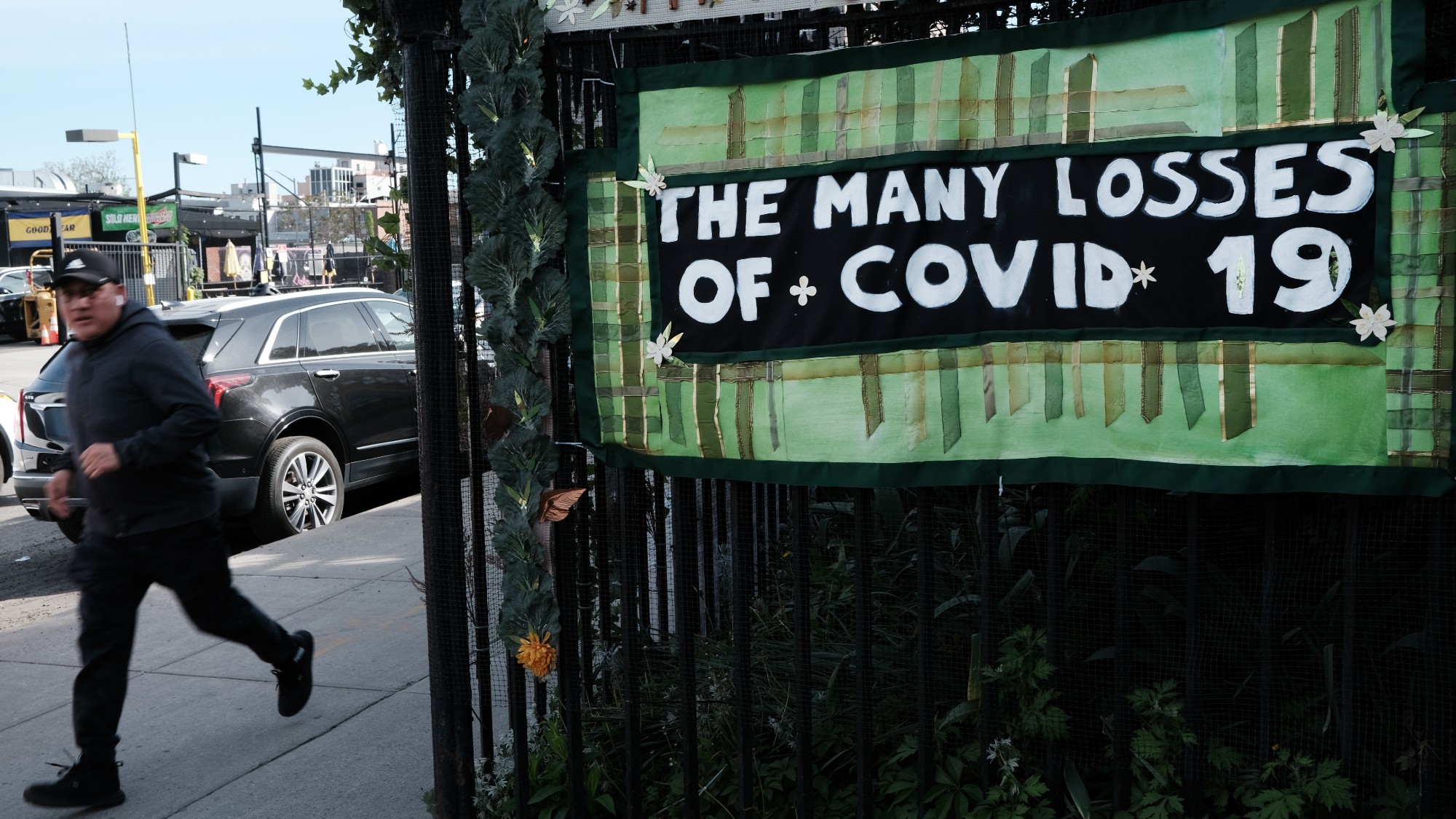Coronavirus and the end of the conservative temperament
Instead of prudence and care, the American right is offering ignorance and ego


A free daily email with the biggest news stories of the day – and the best features from TheWeek.com
You are now subscribed
Your newsletter sign-up was successful
Conservatism is less a fixed set of beliefs, many conservatives have long argued, than it is a temperament.
It's "not an ideology or a creed," David Brooks wrote at The New York Times, "but a disposition, a reverence for tradition, a suspicion of radical change." Temperamental conservatism, better sketched than precisely defined, is about understanding our own finitude, being prudent and careful. It is frugal and local, concerned with self-reliance but also charity. National strength and wealth are to be conserved for the future, never wasted, not spent on needless conflict or crude nationalism. "Temperamental conservatism understands that in order to preserve anything, it must be kept within certain limits," explained The American Conservative's Daniel Larison. "It recognizes that resources are finite and can be exhausted by current generations at the expense of posterity."
Brooks and Larison both concluded temperamental conservatism has been deleteriously eroded by the Republican Party's shift toward shallow ideology, rejection of economic and military limits, and epistemological hubris. The American right's response to the global pandemic of COVID-19 shows that erosion is nearly complete.
The Week
Escape your echo chamber. Get the facts behind the news, plus analysis from multiple perspectives.

Sign up for The Week's Free Newsletters
From our morning news briefing to a weekly Good News Newsletter, get the best of The Week delivered directly to your inbox.
From our morning news briefing to a weekly Good News Newsletter, get the best of The Week delivered directly to your inbox.
Temperamental conservatism's response to the threat of pandemic would be a "better safe than sorry" approach, not panic-induced prepping but judicious stockpiling of enough supplies to make reasonable self-quarantine possible. As the conservative temperament is not stridently individualist, it would also include some preparation to help family, friends, and neighbors who, for logistical or financial reasons, can't create a stockpile of their own. Understanding the motivation here is crucial: It's not rash indulgence of fear. It's prudence and a sense of community responsibility, preservation, and benevolence.
My colleague Damon Linker's Friday repudiation of "the pretense of mastery and control" and acceptance of the "profound and painful lesson" of our limitations which the novel coronavirus is teaching us is an archetypal example of the conservative temperament. So are calls from National Review's Michael Brendan Dougherty for a "sober-minded realism" which rejects the false "notion that things will go on roughly as they always have." The conservative temperament thinks ahead and plans accordingly. It would rather err on the side of being too careful than too reckless or presumptive that everything will work itself out for the best.
This description is likely ringing strange if you've tracked reactions to the spread of COVID-19 from much of the American right. The contrast was especially stark before President Trump's Wednesday address and Friday emergency declaration, in which he appeared to take the pandemic seriously after weeks of suggesting coronavirus is less concerning than the seasonal flu and making clear that his priorities here are the stock market and his own re-election.
More common — or, at least, louder — than recommendations of prudence has been irresponsible advice like that doled out by talk radio celebrity (and elderly lung cancer patient who will not fare well if he is infected) Rush Limbaugh. "This coronavirus, they're just — all of this panic is just not warranted," Limbaugh said in Wednesday's broadcast. "This, I'm telling you, when I tell you — when I've told you that this virus is the common cold." Limbaugh lied that the media and prominent Democrats have "gleeful, gleeful attitudes" about COVID-19, claiming it "appears to be made-to-order for objectives that have long been held by the American left, the Democrat [sic] Party, the media."
A free daily email with the biggest news stories of the day – and the best features from TheWeek.com
I am as concerned about misuse of the pandemic to permanently expand state power as anyone. But what Limbaugh said is dangerously untrue, and a persuadable listener could easily conclude there's no need to store up any extra food or anticipate an illness any more serious than a runny nose.
Tucker Carlson excepted, many Fox personalities have taken a similar line. Fox Business host Trish Regan said COVID-19 is a "scam" to "impeach the president." Fox & Friends host Ainsley Earhardt on Friday announced now is "the safest time to fly." "From the White House communications office to the MAGA meme warriors of Instagram, from the primetime partisans on Fox News to the Trump campaign's Facebook feed, the overarching message has been the same," summarized The Atlantic's McKay Coppins. "Pay no attention to the fake-news fear-mongering about the coronavirus. It's all political hype. Things are going great."
The insistence that advice to prepare for an outbreak is "panic" or "fear-mongering" gives away the game. The sensible measures temperamental conservatism would inspire have nothing to do with panic — quite the opposite. You prepare so you don't panic, and if the whole thing turns out to be milder than anticipated, wonderful! You have some extra dry goods. You can still eat them. Better safe than sorry.
But Trump, Limbaugh, and their cohort don't — or can't — conceive of preparing to self-isolate out of prudence and concern for others. They are fools, and their complacency is destructive. They conflate preparedness with panic because their own mindsets are utterly saturated with intemperate fear.
That's bad under normal circumstances. In a time of pandemic, the end of the conservative temperament among the American right may literally prove deadly.
Bonnie Kristian was a deputy editor and acting editor-in-chief of TheWeek.com. She is a columnist at Christianity Today and author of Untrustworthy: The Knowledge Crisis Breaking Our Brains, Polluting Our Politics, and Corrupting Christian Community (forthcoming 2022) and A Flexible Faith: Rethinking What It Means to Follow Jesus Today (2018). Her writing has also appeared at Time Magazine, CNN, USA Today, Newsweek, the Los Angeles Times, and The American Conservative, among other outlets.
-
 The environmental cost of GLP-1s
The environmental cost of GLP-1sThe explainer Producing the drugs is a dirty process
-
 Greenland’s capital becomes ground zero for the country’s diplomatic straits
Greenland’s capital becomes ground zero for the country’s diplomatic straitsIN THE SPOTLIGHT A flurry of new consular activity in Nuuk shows how important Greenland has become to Europeans’ anxiety about American imperialism
-
 ‘This is something that happens all too often’
‘This is something that happens all too often’Instant Opinion Opinion, comment and editorials of the day
-
 The billionaires’ wealth tax: a catastrophe for California?
The billionaires’ wealth tax: a catastrophe for California?Talking Point Peter Thiel and Larry Page preparing to change state residency
-
 Bari Weiss’ ‘60 Minutes’ scandal is about more than one report
Bari Weiss’ ‘60 Minutes’ scandal is about more than one reportIN THE SPOTLIGHT By blocking an approved segment on a controversial prison holding US deportees in El Salvador, the editor-in-chief of CBS News has become the main story
-
 Has Zohran Mamdani shown the Democrats how to win again?
Has Zohran Mamdani shown the Democrats how to win again?Today’s Big Question New York City mayoral election touted as victory for left-wing populists but moderate centrist wins elsewhere present more complex path for Democratic Party
-
 Millions turn out for anti-Trump ‘No Kings’ rallies
Millions turn out for anti-Trump ‘No Kings’ ralliesSpeed Read An estimated 7 million people participated, 2 million more than at the first ‘No Kings’ protest in June
-
 Ghislaine Maxwell: angling for a Trump pardon
Ghislaine Maxwell: angling for a Trump pardonTalking Point Convicted sex trafficker's testimony could shed new light on president's links to Jeffrey Epstein
-
 The last words and final moments of 40 presidents
The last words and final moments of 40 presidentsThe Explainer Some are eloquent quotes worthy of the holders of the highest office in the nation, and others... aren't
-
 The JFK files: the truth at last?
The JFK files: the truth at last?In The Spotlight More than 64,000 previously classified documents relating the 1963 assassination of John F. Kennedy have been released by the Trump administration
-
 'There is a certain kind of strength in refusing to concede error'
'There is a certain kind of strength in refusing to concede error'instant opinion 'Opinion, comment and editorials of the day'
